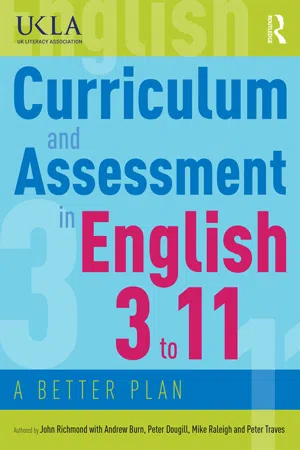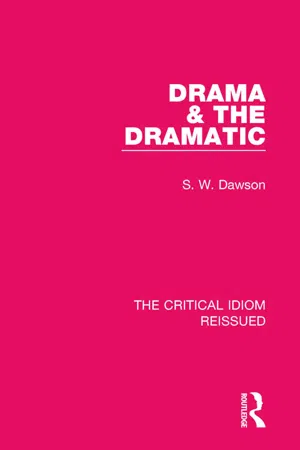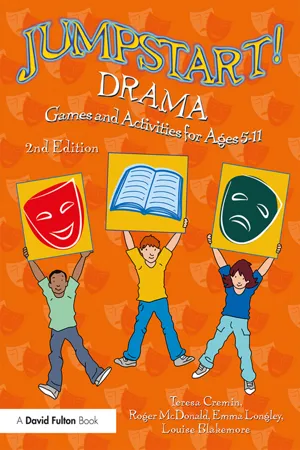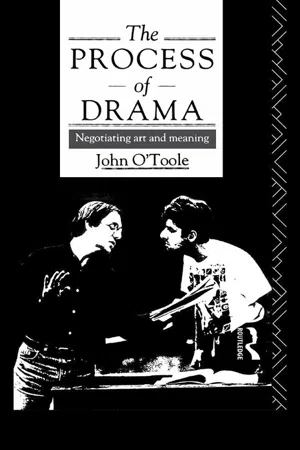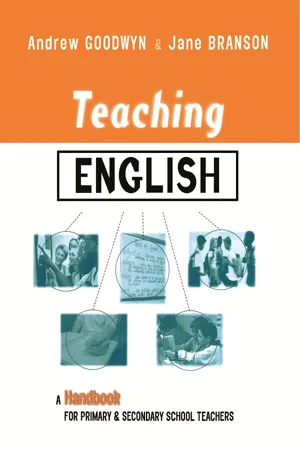Drama Genre
The drama genre encompasses literary works that are intended to be performed on stage, often involving dialogue and conflict between characters. It typically explores human emotions, relationships, and societal issues, and can range from tragedies to comedies. Drama is known for its ability to evoke strong emotions and provoke thought, making it a powerful form of storytelling.
7 Key excerpts on "Drama Genre"
- eBook - ePub
Curriculum and Assessment in English 3 to 11
A Better Plan
- John Richmond, Andrew Burn, Peter Dougill, Mike Raleigh, Peter Traves(Authors)
- 2017(Publication Date)
- Routledge(Publisher)
...Drama is a fundamental part of education for culture. Learning through drama and learning about drama are equally valid approaches. There will be occasions when the one or the other approach predominates. There will be occasions when both are in play. p.214 All areas of the curriculum are potentially capable of supplying content whose learning will benefit from the use of drama. For the teacher of language, literacy and literature, the range of possibilities for the enrichment of learning through drama is wide. Learning about drama will draw on a diversity of theatrical traditions, styles and techniques. It should also draw on traditions, styles and techniques which have developed in drama on film and television and which are developing in drama on recently invented digital platforms. Drama’s official status in the National Curriculum in England is a matter of unfinished business. At some point in the not too distant future, England’s Department for Education should complete the business by according drama the status of a full National Curriculum subject. If this were to occur, it would not of course mean that drama ceases to be a key activity, an essential mode of learning, in any area of the curriculum. It would simply mean that an activity which, along with music, image-making and dance, is as old as human civilisation itself, would finally have been accorded proper official recognition in England’s schools....
- eBook - ePub
- S. W. Dawson(Author)
- 2017(Publication Date)
- Routledge(Publisher)
...The simple ‘a book’, indeed, raises a number of questions, more particularly, what sort of ‘book’? Certainly not any sort. On the contrary, a particular kind of book, a play. If the book is not dramatic, the ‘exhibition’ will not be dramatic either. To determine what is drama, what is dramatic, is to be concerned with books; that is, the criteria are ultimately literary. To become thus entangled in apparent contradictions is a necessary condition of embarking on any discussion of drama. In a study of this nature I shall, of course, be primarily concerned with dramatic literature as literature, but what I have to say is dependent throughout on an understanding of what a play in performance is, and how the nature of plays has been, and will continue to be, determined by the conditions under which they might be acted. We cannot escape from the paradoxical truth that a play unacted remains somehow incomplete, despite the fact that any one performance of the play may be so untrue to its spirit and meaning as to be positively unhelpful to our understanding of it. Any dispute as to the meaning and interpretation of a play takes us back to the words. ‘The lines of the play are the only guides a good director or actor needs’ (Suzanne K. Langer, Feeling and Form, p. 315). In our reading of plays we are placing ourselves, for the most part unconsciously, in the position of the producer and his entire company of actors, and any critical discussion of a play that is not in some sense the sketch of a production is not likely to enhance our understanding. This does not imply that any reasonably intelligent reader could produce or act in the play in question; but on the other hand neither a talent for acting nor a command of all the skills of a theatrical producer is in itself a qualification for pronouncing on drama, as the published utterances of actors and producers daily testify...
- eBook - ePub
- Marjorie Boulton(Author)
- 2014(Publication Date)
- Routledge(Publisher)
...In Sheriff's Journey ’ s End ordinary young soldiers in a dug-out are treated tragically; in Eliot's The Family Reunion a fairly ordinary family (though it is mildly aristocratic) provides the material for poetic tragedy with a Greek inspiration; in J. M. Synge's Riders to the Sea poor peasants have tragic dignity. The main types of drama may be listed for the use of the student, but with the warning that in all classes there are exceptions, overlaps and anomalies. 1. Tragedy A play with a sorrowful ending, usually at least one death; the action and thoughts are treated seriously and with a respect for human personality. The central character, according to Aristotle—and this still often holds—is a person of admirable character and important position who is ruined by some one flaw of character such as the impetuosity of Oedipus, the ambition of Macbeth or the credulity of Othello. It is usual for the diction to be dignified, but not necessarily poetic or even dignified in the sense of being correct English—the dignity comes from within and expresses the tragic importance of the human beings and their situations, as in the colloquial language of A Streetcar Named Desire, parts of Children in Uniform, or Arthur Miller's The Crucible and Death of a Salesman. An important feature of true tragedy is that we are left with a sense of the greatness of man as well as of the suffering involved in human life; these small but passionately individual creatures who struggle with their destiny are curiously important. In tragedy, after one of the crises, the human dilemma becomes insoluble; there is no going back and no easy answer or happy ending; the emotional conflicts are deep and almost unbearable; but the creatures suffering these agonies are worth our concern. 2. Melodrama This is the poor relation of tragedy. It may have a sad or a happy ending, though the sad ending—a pile of corpses or a screaming lunatic—is perhaps more completely melodramatic...
- eBook - ePub
Jumpstart! Drama
Games and Activities for Ages 5-11
- Teresa Cremin, Roger McDonald, Emma Longley, Louise Blakemore(Authors)
- 2018(Publication Date)
- Routledge(Publisher)
...Through the use of the different drama conventions, children can move imaginatively in and out of texts, living the moments and experiencing the emotions. Drama can be used across genres and text types, providing a creative way in which to develop comprehension, allowing children to access and understand texts in a meaningful way. Drama provides opportunities for children to: Develop their language and extend their vocabulary Create visuals of what they see in the mind’s eye Explore plot lines at differing depths Develop empathy for characters’ situations Deepen understanding of character actions and reaction through vicariously living their experiences Enrich understanding of how narratives are built up and link together Make thoughtful predictions and draw deeper conclusions before, during and after reading the text Develop their inferential understanding and explore other higher level comprehension skills Apply the information they have deduced and interpret the ideas suggested in the text in action Explore language and develop an understanding of how it impacts on the reader Engage in response to text, no matter what reading level they are, and access more difficult texts that may be too complex when working independently Make personal connections to the text Explore issues and dilemmas from differing points of view Leading Drama in the School Drama can richly enhance the learning experiences of children, whether through informal opportunities in a role play area, through the use of standalone drama techniques, through the more extended use of drama techniques to build a fictional world or through drama that is more performance oriented...
- eBook - ePub
The Process of Drama
Negotiating Art and Meaning
- John O'Toole(Author)
- 2003(Publication Date)
- Routledge(Publisher)
...This contributed to his ‘discovery’ that the dialogic mode is the essential element that characterises drama. This in turn inevitably drew attention to conflict, an inevitable feature of the interaction of characters and their situation in most plays, as the central element. One problem of drama and theatre in education and other processual genres, if we may interpret them as new genres based on the joint participant rather than the separable playwright/ medium/ audience of western theatre, is that the available discourses inevitably limit thinking and the ability fully to manage the possibilities of the medium. The most readily available discourses are those of theatre and theatre study. Even Suzanne Langer, in the very act of proposing a radical new definition of tension which has become influential and valuable in developing the genre, is looking over her shoulder at Hegel: ‘even before one has any idea what the conflict is to be…’ 40 Though a few of the examples of dramas within this book and this chapter contained no conflict at all, yet sustained tension throughout—for example, Spacemen Have Landed in Leeds — most drama clearly does incorporate those elements of anger and conflict quite proper to the interactions of characters in a situation. One teacher’s definition of his practice as ‘I just put the children in a hole and then let them argue and fight their way out of it’ is still regarded as a classic compression of acceptable practice. 41 Another, more recent: ‘If emotions are to be engaged, then the most useful is a sense of righteous indignation.’ 42 Since the territory of drama in education is rarely concerned with just personal characteristics, conflicts usually arise within the situation as clashes of values and attitudes, or the conflicts which the predicaments of the situation evoke, more usefully classified as dilemmas...
- eBook - ePub
The Collected Works of Georg Wilhelm Friedrich Hegel. Illustrated
The Phenomenology of Spirit. The Logic of Hegel. Hegel's Philosophy of Mind
- Georg Wilhelm Friedrich Hegel, J. B. Baillie, William Wallace, S. W. Dyde, F. P. B. Osmaston, J. Sibree, Elizabeth Sanderson Haldane, Ebenezer Brown Speirs(Authors)
- 2021(Publication Date)
- Strelbytskyy Multimedia Publishing(Publisher)
...Viewing for a moment the course of our present inquiry in retrospect, it will be seen that we have, first, established the principle of dramatic poetry in its widest and more specific characteristics, and, further, in its relation to the general public. Secondly, we deduced from the fact of the drama’s presenting an action distinct and independent in its actually visible development the conclusion that a fully complete sensuous reproduction is also essential, such as is for the first time possible under artistic conditions in the theatrical performance. In order that the action, however, may adapt itself to an external realization of this kind, it is necessary that both in poetic conception and detailed execution it should be absolutely definite and complete. This is only effected, our third point, by resolving dramatic poetry into particular types, receiving their typical character, which is in part one of opposition and also one of mediatory relation to such opposition, from the distinction, in which not only the end but also the characters, as also the conflict and entire result of the action, are manifested. The most important aspects emphasized by such distinction and subject to an historical development are those peculiar to tragedy and comedy respectively, as also the comparative value of either mode of composition...
- eBook - ePub
Teaching English
A Handbook for Primary and Secondary School Teachers
- Andrew Goodwyn, Jane Branson, Andrew Goodwyn, Jane Branson(Authors)
- 2013(Publication Date)
- Routledge(Publisher)
...5 The role of Drama Joanna Struthers An introduction to Drama Drama, whether it is within English or as a discrete subject, can seem the most liberating and creative or the most exhausting and terrifying subject in the entire curriculum. Either you feel excited and challenged as you walk into your designated Drama space, which may of course be doubling up as an art exhibition area, common room or assembly hall, or you wonder with an all-consuming dread where the chairs are and what stops it all turning into a riotous romp. Drama has a clear role within the English curriculum in that scripts form a regular part of textual analysis at every Key Stage. Within the Framework for Teaching English in Years 7 to 9 there are specific requirements to explore aspects of texts in role and to develop and reflect upon performance skills through active participation and evaluation. Being able to discuss a character’s motivation and the dramatic tensions that exist on stage with the live performance and staging in mind is clearly advantageous. Likewise, incorporating the vocabulary of Drama into responses to English texts is becoming more and more an expected skill. The directing of a scene in Macbeth, the tracking of a key character’s development in a GCSE text such as The Glass Menagerie, the close analysis of a short exchange of dialogue all demand a working knowledge of the skill of the dramatist, and where better to realise this than through the practical application of Drama. Using Drama activities in the classroom is discussed in more detail later in this chapter. The provision for Drama within the curriculum can vary dramatically from school to school: from regular weekly lessons in Key Stage 3 to GCSE and AS/A2 level to a haphazard provision within PHSE or the English curriculum, or perhaps once fortnightly lessons for Key Stage 3 pupils...
